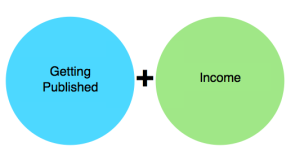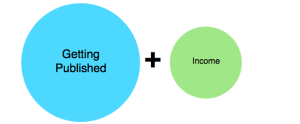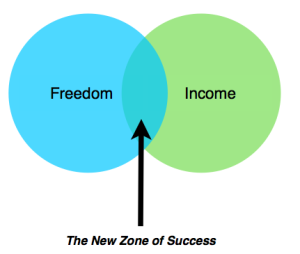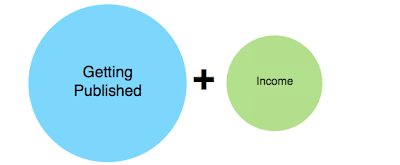“Rich are the records . . . with stories of penniless authors, who, sick with hope so long deferred, and at last despairing, have resorted to wild and tragic devices . . .”
So begins a story in the Los Angeles Examiner,New Year’s Eve edition, December 31, 1905. The feature tells the tale of one such desperate author, a school teacher named Edith Allonby. For four years she’d labored on a novel, The Fulfilment [spelled with one “l”] into which she poured heart and soul. She had been published before, but her books had not been hits. The Fulfilment was going to change all that. In fact, Miss Allonby was certain its spiritual themes would change the world. (Indeed, she thought the book had been given to her by God, so the pressure was on).
But the book was rejected. First, by her own publisher. Then by all the other publishing houses she sent it to. “I have submitted my book to all these men,” she wrote in a note. “I have tried in vain. They will not accept it, yet shall ‘The Fulfilment’ reach the people to whom I appeal, for I have found another way.”
After finishing the note, Miss Allonby changed into a silk evening gown, put fresh flowers in her hair, and sat in a comfortable chair. She was found dead the next day, her manuscript on her lap and an empty bottle of carbolic acid at her side.
And so it has been for countless authors for hundreds of years. Not normally ending in suicide (though such cases exist) but often in frustration, depression and despair. (The Fulfilment, BTW, was published in a limited edition after Miss Allonby’s death).
There was one primary reason for all this distress: Their fate as writers was not in their own hands. To get anywhere close to “success” they had to be accepted by an established publishing house (which alone had the means to produce and distribute a book), and then hope that they earned some money for their efforts.
There was one primary reason for all this distress: Their fate as writers was not in their own hands. To get anywhere close to “success” they had to be accepted by an established publishing house (which alone had the means to produce and distribute a book), and then hope that they earned some money for their efforts.
Those two things—acceptance and income—defined writing success.

Included under “Getting Published,” we can list some ancillary things writers hope for. Like getting on a bestseller list. Perhaps being nominated (even winning) a prestigious award. Maybe just the feeling of being part of an exclusive club.
But now we are experiencing a sea change on the other side of the diagram:
We all know the traditional model is shrinking. Advances on new contracts are at historic lows. With physical shelf-space disappearing, print revenues are down. While digital income is up for the publishers, the slice of that pie given to authors remains stagnated at 25% of net (or roughly 17.5% of retail). And new writers are finding publishers increasingly risk averse regarding debut authors.
Still, many writers remain focused on that left circle. It represents some sort of “validation” even though it could very well mean less income (the right circle) and fewer readers.
But now a new model of writing success has appeared. Writers, for the first time since the troubadour era (when you could go out on your own and make up stories in song and take in some coin), have it within their power to get their writing out there without a middleman (the fancy term is “disintermediation”).
And further, unlike self-published authors of yore, they actually have a chance to make real dough. Every day we are hearing more accounts of self-published writers who are earning significant income as independents.
Yet income alone is not the main draw of this new model, which looks like this:
Yet income alone is not the main draw of this new model, which looks like this:
Freedom is the invaluable commodity here. To be able to write what you truly want to write, and know that you can get it into the marketplace, is tremendously liberating. It is, in fact, the engine of happiness for a writer. It’s exhilarating to write for yourself, see what you’ve written, fix it, and keep on writing—and be assured that it will have a place in the stream of commerce, for as long as you live.
This does not mean that going the traditional route is a spurious view of “success.” If one seeks that validation, it’s there to be pursued. The point is, however, that it is no longer the only game in town. Which is why I am more jazzed about being a writer than ever. Not just because of increased production and income, but because of the freedom to take responsibility for my own work.
This does not mean that going the traditional route is a spurious view of “success.” If one seeks that validation, it’s there to be pursued. The point is, however, that it is no longer the only game in town. Which is why I am more jazzed about being a writer than ever. Not just because of increased production and income, but because of the freedom to take responsibility for my own work.
Let me be quick to point out, however, that this responsibility carries challenges. Being in charge means you are CEO of your own company. You alone are in charge of quality control and production. You can expect to experience the stresses and strains of running a small business. You will need new skills to handle them. These can be acquired, but only through effort and self-discipline.
But it’s more than worth it to be holding the reins of your own writing and life.
I think Miss Allonby would have felt that way, too. Had she been able to self-publish, she might have lived a long, full life. Maybe she’d have written many more books, grown a readership, and made some money, too.
I can say this because, in one of life’s ironic and poignant turns, The Fulfilment by Edith Allonby is now available for the Kindle.
I can say this because, in one of life’s ironic and poignant turns, The Fulfilment by Edith Allonby is now available for the Kindle.
So how would you define success as a writer?








Very interesting story, though I certainly wish it hadn’t driven her to such extremes.
Having options is nice. And to be honest, the digital revolution is at least partially responsible for me picking up a little more speed (relatively speaking) in my writing. I have always favored stories that are more geared to a niche market then the masses (ie. I love historicals but not historical romances. The second I can find in abundance, the first not so much).
With the digital revolution, someone besides “the masses” can be catered to as well. And it’s about time!
Poor Miss Allonby. I’m not so sure that if she’d been able to e-publish, The Fulfilment, that she would have been satisfied. Maybe. I think it depends on if her success was linked to the need for a certain amount of money to supplement her teaching income or if it was all linked to personal satisfaction.
I’m thrilled to be published and I do want to e-publish some things in the future, and knowing I can do that is satisfying. I’m not so sure that any publishing will be satisfying financially for those who don’t already have a great track record, with the exception of a few.
With the traditional model shrinking I can’t help but wonder what that means for those of us who were traditionally published for the first time in this last year.(Thoughts on this anyone?)We aren’t well known, we’re just getting our books out there, and many of us, me included are working day jobs, like Miss Allonby, and writing too.
I used to dream of writing full time and quitting the day job, but with the huge changes in the publishing industry I don’t think that is any longer an option. Thank God I have a day job I love. So maybe when I retire from the day job the dream will change again.Interesting time we are living in as writers.
Miss Allonby’s story is a sad one and makes ‘disappointment’ a much more serious emotion for some rather than others. Interesting that her story is on Kindle, I will check it out – hopefully there are some reviews.
I don’t think I have the level of determination that Miss Allonby had. Does that mean I will fail? Gosh, I hope not.
Unfortunately,as a new writer, I am still aiming for the validation of a traditional publisher. Be that at my peril maybe nowadays. A friend of mine has just self published and her crime novel is doing well in the UK kindle charts, so I can see both sides of this.
I will keep trying and keep writing and with time, I’ll see where that takes me.
I loved this post.
When I think of the digital revolution in self-publishing, I picture a kid trying to ride his bike the first time after his dad removed the training wheels–all wobbly and shakey. Some will fall, skin their knee and be afraid to get up and try again. A few will finally steady out, get control and head off down the sidewalk, cruising with the wind.
Success is an elusive term different for everyone. For me, it was the first time I told someone without a second’s hesitation that I was a writer.
Miss Allonby’s choice is tragic, but self-publishing was an option in the early 1900’s as it is today. Why she would not go that route can only be speculation on our part, but most artists face similar problems. While they need money to live, what they really want is someone to pat us on the back and say, “Good job!” While everyone has the option of self-publishing, it works best for those people who are not concerned about what people think of their writing or how much money they can make, but rather they believe they have a message that the world need to hear.
Jillian, regarding the dream of going full time, remember how many fiction writers made an actual living under the traditional model: Not many! Even back in flush times for the publishing industry.
Just keep up the daily quota. “The most crucial thing a writer does is produce.” (Robert B. Parker). Then you have product as you consider future options.
The main thrust of this post, for me, is that these options free us as writers, they don’t restrict us.
Rebecca, I would not use the term “unfortunately” to describe your desire to be published the traditional way. Again, it’s all about choices now, options.
The good news is you can be doing many of the things a successful self-published writer does, even as you wait for a trad pub to call you.
You can produce work.
You can learn to market.
You can learn copywriting skills to describe your work.
You can envision and even plan for a self-publishing future.
You can study business skills, like goal setting, quality control and time management (all of which will serve you no matter which way you go.)
You can remember that you can run on parallel tracks. You can self-publish some work as you continue to wait for the trad train to pull into the station.
Options. Freedom. Nice things writers never really had before.
You have described my definition pretty well. I have a standard in my head I refer to as the “Reward to BS Ratio.” I came to the conclusion over a year ago that, under the current circumstances, the BS associated with obtaining a contract and doing what came after, were not worth the potential rewards. (Not when evaluated realistically.) I then put out a novel I’d finished a few years ago for Kindle and Nook and had a ball. I’m not making any money, but I have received some flattering notices from writers whose work I respect greatly. (Charlie, Stella, Tim Hallinan, Mand Adrian McKinty, to name a few.) That’s good enough for me.
Plus, Dana, there’s nothing limiting about that. It doesn’t shut any doors. You can now add more books (what you have to do anyway under a trad contract), because self-publishing is a volume business. Do it consistently, with quality, and you will make dough. It might never be quitting-the-day-job dough, but it can be significant.
Yet “having a ball” is its own reward, too, isn’t it?
If we can’t take rejection without committing suicide we should probably be in another business. Many authors, failed and successful have eaten the gun. Self-diagnosed failure in one endeavor need not lead to failure in others for which one is better suited. Some people are just suicides waiting for an excuse. Failure to be recognized for our brilliance is hardly any more of a reason to do ones self in than a cloudy Tuesday morning. The old girl could have written another book under a man’s name. Failure is often someone else’s fault or lack of imagination.
I doubt THE FULFILlMENT will be much downloaded in Kindle either with the exception of a few who read this blog and are curious.
In any business or sport there are failures. Usually this is because of variables not under the trier’s control, or a distinct lack of ability accompanied by delusions of ability.
Self publishing is a better idea all the time, but is certainly no more apt to lead to success than publishing through a house.
I have a friend who was finally able to quit her day job and write full time. Her health is not good, so she either has savings or disability income.
She writes romances and self-pubs. She has a small readership that is increasing gradually. She is happy, gets to spend her time and health in a way that makes her happy and brings in a little coin every month. That is FTW.
When I get out from under the lawsuit that has plagued my family company for 6 years (I should be answering interrogatories right now), I hope to do a hybrid. A legal thriller that I hope will interest mainstream pub and self-pubbed shorter works in other genres as well as blogging for bucks, proofing, freelancing, and some legal services geared toward self-pubs (copyright and trademark knowledge, I haz it) that I hope will generate a stream of passive income so I can throw off my day job for semi-retirement/self-employment (you know, work 14 hours a day instead of the 10 I work now).
The future is truly ours. In some ways good, we don’t have to depend on the elusive mainstream contract and then fit ourselves into a slot. In some ways bad, because the downside of freedom is there is no one to help you and guide you. Like the fortune cookie said, we truly do like in interesting times.
Terri
PS: My blog project, “The Story of Book,” was going to honor TKZ this week, but the photo disc committed ritual suicide and is unreadable. I guess I tried to fit too much awesome on one disc and it couldn’t take the pressure. Next week!
And no, at $6.99 for a public domain title, The Fulfillment, isn’t going to garner any success. ::eyeroll::
I paid 99 cents for the entire 15-book public domain OZ series only because it was nicely formatted.
Terri
We are all saying the same things and thinking the same thoughts, Jim. Just wrote a post about how publishing is on a spectrum now.
I like your emphasis on the increased responsibilities. I think that is very true and will be a key factor in writing career success going forward.
Terri:
In some ways bad, because the downside of freedom is there is no one to help you and guide you.
Let me suggest that there are abundant guides out there to help the indie on his or her way. I will be teaching a class in LA next month on the subject, and one can read innumerable blogs that describe the process (which is not complicated at all).
As Christina suggests, the key is “responsibility.” You will have to be determined and dogged when everything is on your shoulders, but personally I like being that way.
James, right you are about the Indie community. I’m already swapping legal work to an expert ebook formatter and a beta critique for a website logo. Totally wish I could come to your class.
Terri
I suppose you can call getting your work published by a traditional publisher “validation,” but that seems like sour grapes to me. (The term “validation” may have appeared in a comment.)
The truth is that for decades, agents, editors, and publishers served as screeners whose chore was to ferret out the best writing available. Now, without those screeners, we all become screeners, and job is an impossible one.
To add insult to injury, some authors who sell books under the new paradigm actually think they are good writers, when the reality is that they are good marketers. Hopefully, someday we’ll return to quality writing, but that won’t happen until we learn that having professional editors screen work for us has value.
To a large degree, the traditional publishers caused their own demise by focusing on the submitting authors’ platforms for sales rather on the quality of the writing and ideas expressed. Thanks for your insights!
Jim,
Absolutely, having a ball is its own reward. You’re right about the other thing, too. My next book will come out in March; WILD BILL will still be around. Maybe the two can build a little synergy. Maybe I’ll discount WILD BILL when WORST ENEMIES drops. Maybe I’ll figure out a way to give people a free copy of WILD BILL if they buy ENEMIES. I’m the person who will suffer the consequences/reap the rewards. It might as well be my fault.
This comment has been removed by a blog administrator.
Options are always good and I hope we are witnessing a time of author empowerment:). unfortunately, as with any creative endeavor there are always going to be those who suffer for their art – so Miss Allonby could end it all in despair if she was writing today. Success is tricky to define for me as I constantly raise the bar…but to be writing better work each time is a must irrespective of the financial gains (though they would be nice!)
I would define success as a writer in the same terms that a would define success in any occupation: making enough money to meet the monthly nut, while at the same time enjoying the work enough that the first thought crossing one’s mind at the beginning of the day is not of suicide. The ultimate acquisition of both sides of that equation at the same time is difficult. Some folks, like Miss Allonby, never get it.
Thank you James. I think time management is the one thing I really need to get a grasp of. Working and writing takes some chunks of time and it’s something I need to try harder at.
There are a lot of options for people out there now, which means as writers we have work damn harder to get out work, not just out there, but seen,
I am having more “success” as an indie author than I ever did when I was traditionally published. I get 10 paychecks from various vendors every month. They add up, each month, to more than ever got in a check from a publisher. I sell more of one series in one day in eBook than Random House could sell in six months.
I sold 347 eBooks in January of 2011; a year ago. By the end of the year I sold 400,000.
The landscape has changed radically and with the freedom does come a lot more responsibility.
Indeed, Bob. It’s SO nice to get paid every month for a change. That, and the speed at which you can publish, make this exhilarating to say the least.
Freedom to blog is a wonderful thing. I look at my numbers in page hits and comments and I’m happy that I’m read. I don’t need to be paid. 😀
Great stuff here, James.
How do I define myself as a writer? I see it. I feel it. So, I write.
I find my definition of success evolving. I wanted to be published, but when I got there, that’s not enough, now I want the book to do well, and for me that means earning enough to justify the faith the publisher put in me. But then it’s not enough for one book, I want to keep writing, I have so many ideas, I want the books to keep coming. Since e-books are not an option for me, I have no faith in my own ability to market, I realize success is doing well enough to keep getting contracts. If people like your writing, your books will sell, and if your books sell, you can keep writing. Maybe it’s crazy, but that is where I am right now. Who knows where I’ll be in a year, or five years. I hope still writing and enjoying it, not like Miss Allonby.
Nice blog, Jim
I originally self published for my family and friends, but in the last year made a fatal mistake by allowing a company I hadn’t researched to convert the manuscript into e-format. Just meeting someone at a conference doesn’t automatically mean they are reputable. Google them! Get references before paying them one dollar and save yourself a lot of grief.
After my experience, I say, go traditional if at all possible.
Appreciate the time and attention you give to helping writers grow, Jim. Interesting post!
Judy Christie
Yes. it’s a challenge to self-publish an Indie book, but what I am seeing more and more – is Community. There are many online communities of writers, and local groups, blog groups (like this one). Now, more than ever, we writers need each other. We need our local groups of writers who critique each other, help each other with ads and blogs and suggest editors and cover ideas. This is one more thing being taken out of the publisher’s hands.
the engine of happiness for a writer. THIS!
Wonderful post that is right on target. Being in control and having successful sales? It’s like nirvana for writers, and I understand why some indie authors never look back.
I’m posting next week about “How Many Book Sales Equals ‘Success'” and will link to this post as a great example of the right way to think about indie publishing.
Hi Jim,
I came across this post by the comment you left on Steve’s blog today. It was a really nice surprise to see you there. Glad I found it. What a great post!
What a story about Edith. And just like you said many other stories like it.
It was always in my heart to be both traditionally pubbed and be an indie author. I really feel this post was meant for me to read. Thank you so much!